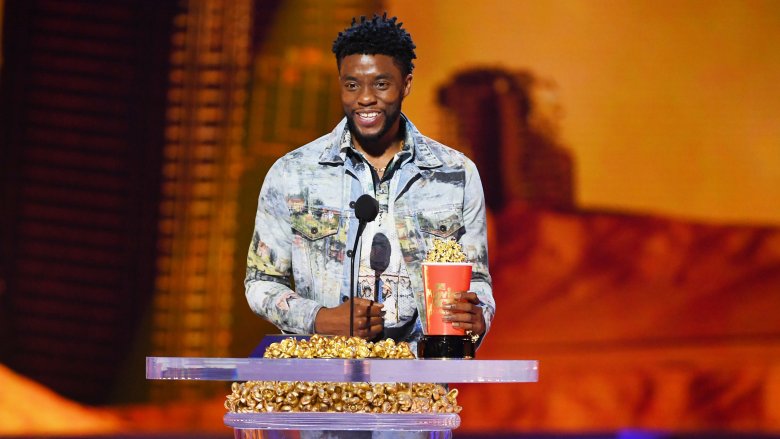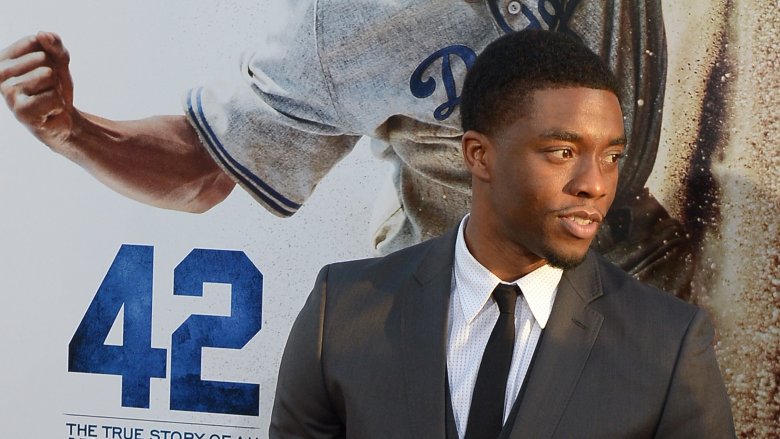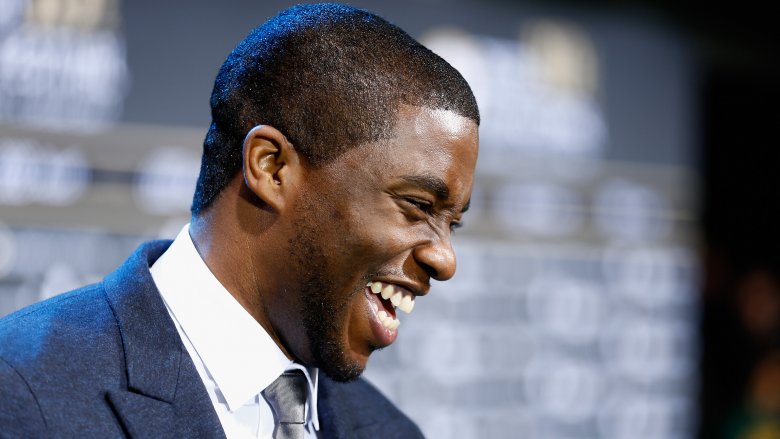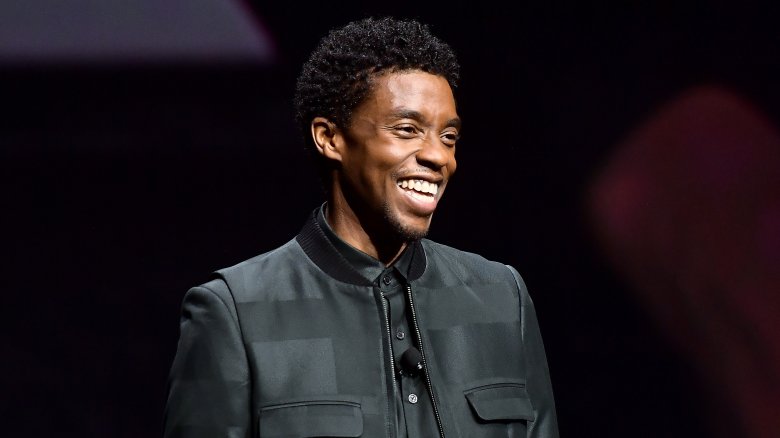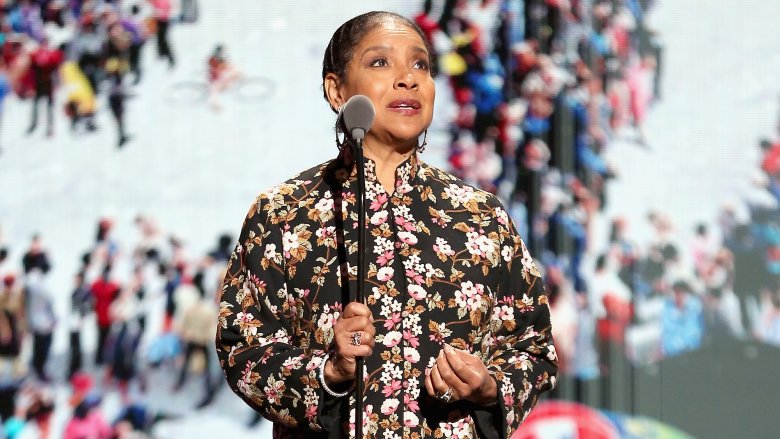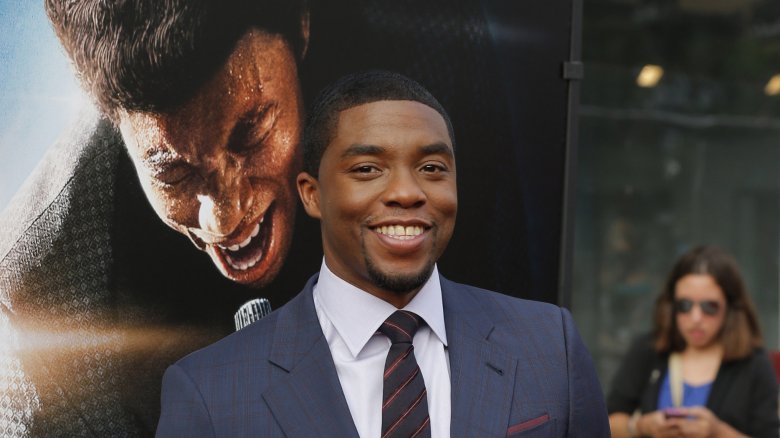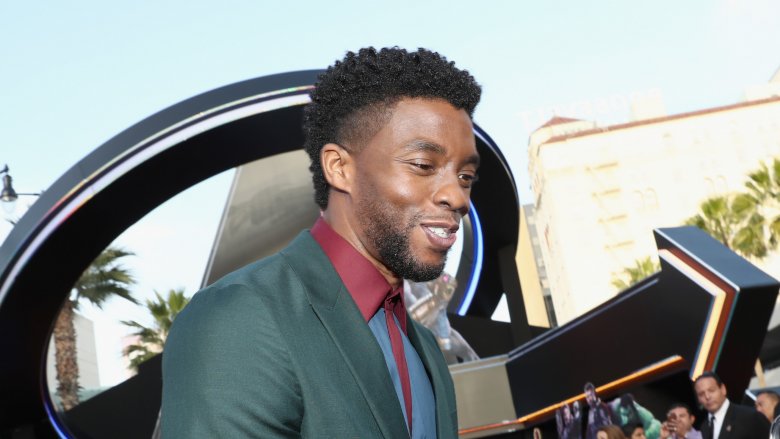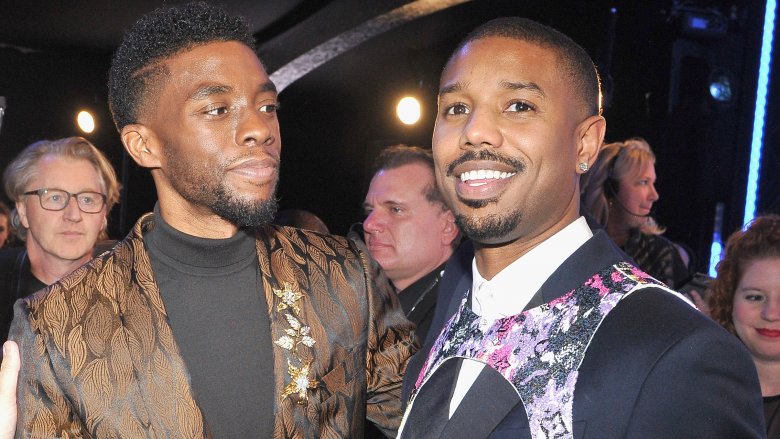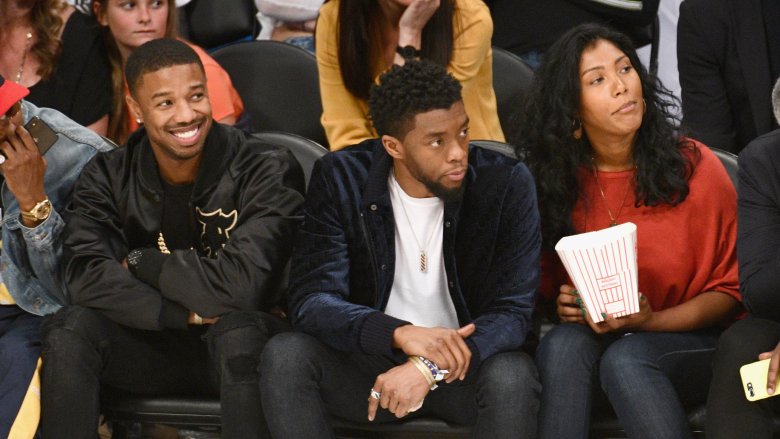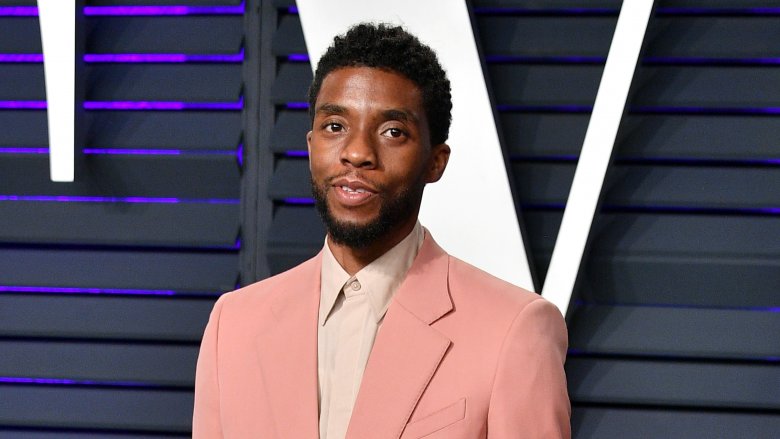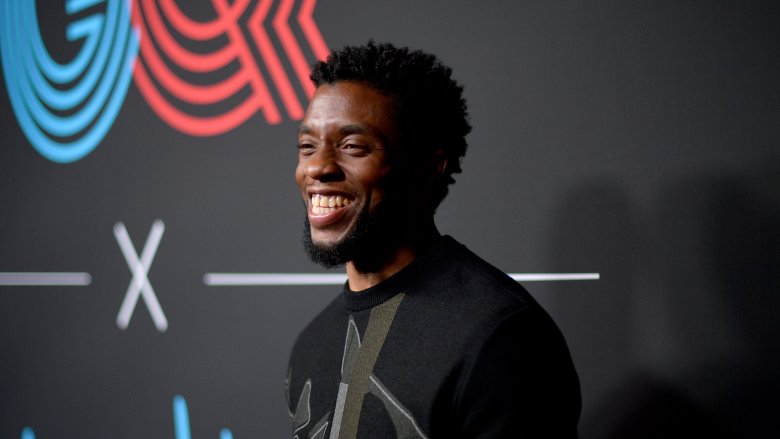The Untold Truth Of Chadwick Boseman
Cast your mind back a few years, and recall that there was a time when most people didn't know what "Wakanda forever!" meant. Names like Okoye, Nakia, and Shuri held no significance for the man on the street. And Chadwick Boseman, who became one of the brightest stars of the MCU, a man as comfortable in high-octane action scenes as he was depicting staid and solemn UN meetings? Well, people might have recognized him, but more likely as "that guy in that biopic last year." T'Challa was coming, but only the most diehard fans knew. And nobody could have anticipated what a massive hit Boseman's regal performance would make his debut movie, the instantly iconic Black Panther.
And while the character had been around for decades, it was truly Boseman's legendary performance as the King of Wakanda that made Black Panther a household name. And so it was a brutal shock to the world when news hit of his passing at the age of 42. According to a statement released by his family, Boseman died after a brave fight with colon cancer for four years.
So, who was Chadwick Boseman? As it turns out, he was even more interesting as the complicated king he portrayed. Join us as we explore the life of Chadwick Boseman.
He had a lot of experience portraying cultural icons
Black Panther changed the world. From its societal significance to its bona fide status as a box office smash, this became T'Challa's Marvel universe, and we're just living in it. As the curtain fell on the character's 2018 solo film, one thing became clear: Black Panther had taken cinema to adventurous new heights. He became, within weeks of his own movie's premiere, a cultural icon.
But this wasn't Boseman's first time playing a world-changing hero. In fact, Black Panther was one of the first times he'd played one that didn't actually exist. Before he stepped into T'Challa's royal sandals, he was depicting the all-time greats of music, sports, and lawmaking. Boseman's first starring role came in 2013, when he portrayed the legendary Jackie Robinson in Brian Helgeland's biopic, 42. He followed this up a year later with 2014's Get On Up, directed by Tate Taylor, in which he brought the electric skill of James Brown to life. Only three years later, he made it a hat trick when he played Supreme Court Justice Thurgood Marshall in 2017's Marshall. Though some stars of the MCU might have had years on Boseman, career-wise, no one had more experience playing heroes.
He was an award-winning playwright
Given that he had achieved the peak of actorly ambitions, it might be surprising to learn that Boseman actually spent much of his life wanting to be behind the camera instead of in front of it. His original aspirations, in fact, didn't even involve the camera at all — only a pen, some paper, and his own imagination. Boseman began his life in the performing arts as a playwright, writing and staging his first play in high school.
It was a deeply personal piece — the story of a basketball teammate who'd been shot and killed while they were still in school. Entitled Crossroads, the play wasn't just a statement for Boseman, but a guiding light. "I just had a feeling that this was something that was calling me," he told Rolling Stone. "Suddenly, playing basketball wasn't as important." Years later, his play Deep Azure would go on to be performed by professional theater companies and even win a few awards.
He went into acting to become a better director
Writing wasn't the only experience Boseman had on the creative side of the performing arts. He also nurtured a deep and abiding interest in being a director, and in fact began to study acting in order to better relate to the actors he believed he'd be working with in a very different capacity. His college degree was a testament to this ambition: he graduated from Howard University in 2000 with a Bachelor's of Fine Arts in directing.
"I really only started acting because I wanted to know what the actors were doing, how to communicate with the actors. And then I realized I'm supposed to do all of it," Boseman remarked in a radio interview with New York's Power 105.1. He went on to study the craft from every angle possible, including a stint at the world-famous Oxford University. And while Boseman's acting talents were a delight for audiences everywhere to enjoy, we can only imagine what the world of art, theater, and cinema might've lost as his life was cut short before he could flex his writing and directorial muscles once again.
Phylicia Rashad was a longtime mentor
Connections are key in any industry, and can be a tremendously positive force in providing for an actor's big break. How can anyone, let alone someone pursuing the arts, navigate such stormy seas alone? Mentorship is particularly key to ensuring the future of any given artform. Only through the passing-down of wisdom from an experienced group to their neophytes can any craft, community, or pursuit build a foundation and all that lies atop it.
Boseman had a few mentors, but veteran actor Phylicia Rashad stands out as a particularly meaningful one. Rashad has a massive treasure trove of experience to share: From her starring role as Clair Huxtable on The Cosby Show to her Tony-winning performance in A Raisin in the Sun, Rashad is a grand dame and an accomplished teacher. Rashad and Boseman met at Howard, where she served as one of his professors. "We were just trying to aspire to her excellence," Boseman recalled to Rolling Stone. Nearly 20 years later, we'd say he's made that goal a reality.
He worked as a drama teacher
Teaching is one of the most everyday acts of heroism around. From something so tiny as a parent teaching their child how to tie their shoelaces to esteemed professors passing down the work of ages, no civilization would have gotten anywhere without people willing to teach others.
Boseman himself had participated in this long and noble tradition, working, naturally, in the world of drama. Back in 2014, the Michigan Chronicle profiled Boseman as a "star on the rise," paying special attention to his tenure at the Schomburg Center for Research in Black Culture in Harlem. There, he worked as a drama instructor as part of the Schomburg Junior Scholars program, and continued to highlight its important work in his new capacity as a world-famous movie star. It just goes to prove the old adage wrong — those who can absolutely do teach, and often grow from the experience.
He seriously considered giving up on acting
Any road can be rocky, but few are more harrowing than that of an actor. One great audition can loft you into the heights of success, fame, and glory — but one terrible audition can doom you forever. Many begin as starry-eyed optimists, certain their big break is around the corner, only to crash and burn a scant few years later as scarred cynics. Hopes are tested, and resilience must build. Only through fortitude can a career in the dramatic arts be accomplished.
Boseman knows this better than most. Before he was cast as Jackie Robinson in 42, he was, in fact, thinking of giving up on acting altogether. "Nobody had called me. Nobody had told me anything. I had gone in for it 100 percent, but there was no reason for me to think I'd done well," he told GQ in 2014. He came perilously close to giving up on acting altogether, until he landed the role of Robinson and the skies began to clear. Given that this interview happened before he was cast in what would become his biggest role by far, even then he didn't realize how much higher he was going to climb.
He and Michael B. Jordan shared a role on All My Children
One of the greatest strengths of Black Panther is its villain. Killmonger is the kind of man who will let nothing get in the way of his goals, to the point of shooting his girlfriend, upending a country's government, and working with the most unscrupulous possible criminals. But, well, he did have some good points. By the end of the film, in fact, Killmonger has even managed to halfway convince T'Challa of the righteousness of his aims. Though T'Challa in no way condones his methods or carries out Killmonger's vision, he does concede that Wakanda owes the world its shelter and knowledge, and he ends the film by taking strides towards making that a reality.
It's only appropriate, then, that T'Challa and Killmonger's actors also share a bit of history in common. Before they were facing off in the deepest pits of the vibranium mines, Boseman and Michael B. Jordan shared the role of Reggie Porter Montgomery, a young gang member on All My Children. There's little record of Boseman's time on the show because he quit in frustration with what he saw as a narrow, cliched role — and so it passed to Jordan, who made it his own. Years later, they'd meet again in circumstances neither could have ever imagined.
He was a varsity basketball player in high school
The Shining put it best: all work and no play will make anyone dull. From nuclear physicists to gardeners, we all need a hobby or two totally unrelated to what puts food on the table. Playing sports on the side is a particularly good habit to take up, as exercise isn't just good for your body and mind, but a fantastic way to meet new people and shore up old relationships.
Boseman, as previously mentioned, played basketball in high school, and saw it eclipsed by drama as his primary passion. But he didn't hang up his high-tops after that epiphany. Boseman continued to play pick-up games to unwind, and is well-remembered by his high school coach. "He had a great attitude," coach Wayne Jones told local news source WSPA, "the type of person and character that you would want on your team." Boseman played varsity all four years of high school, in addition to participation in track and field, the drama department, and the speech and debate team. "You gotta pull for a kid like him," Jones remarked. Clearly, the world agrees.
Denzel Washington helped him go to Oxford
Phylicia Rashad might rank as one of Boseman's most impressive mentors, but she's far from the only one. It turns out that Oscar winner, box office breaker, and general Hollywood icon Denzel Washington also had a hand in Boseman's success when he helped fund Boseman's time at a prestigious summer theater program in Britain's legendary Oxford University.
After Boseman and a number of other students got into the program but found that they wouldn't be able to afford it, Rashad reached out to some celebrity friends and, according to Boseman, "pushed for us." He discovered after the fact that Washington had funded him, and wrote him a thank-you letter. Though he was reluctant to reach out to him for fear that Washington might think he was asking for extra help, Boseman did, in fact, get to thank Washington at the New York premiere of Black Panther. Nothing like lending a helping hand, especially when it gets repaid with one of the biggest smash hits of the decade.
He comes from a huge extended family
Stars come from all sorts of backgrounds. Some, like Loretta Lynn and Dolly Parton, draw from childhoods rich in love but poor in finances. Some, like Drew Barrymore, come from long and glamorous lines of Hollywood hitmakers. And some, like Boseman, just come from loving homes and families that cheer them on through thick and thin.
There's just one thing: when you take extended family into account, his number of blood relatives ends up less like a cheering section and more like the entirety of the bleachers. "When my grandmother died," he told Mr. Porter in 2016, "she left 115 grandkids and great-grandkids. That was just one side." He credited his family's love and support as key to his ascension to studio stardom, and one can bet they must be proud of how gloriously far he'd gotten in his ambitions... all 115-plus of them.
